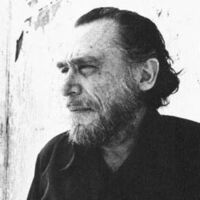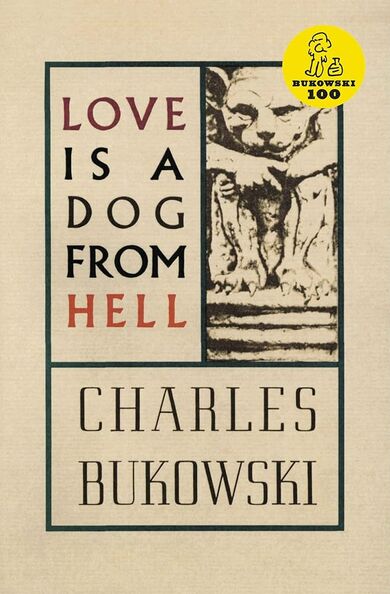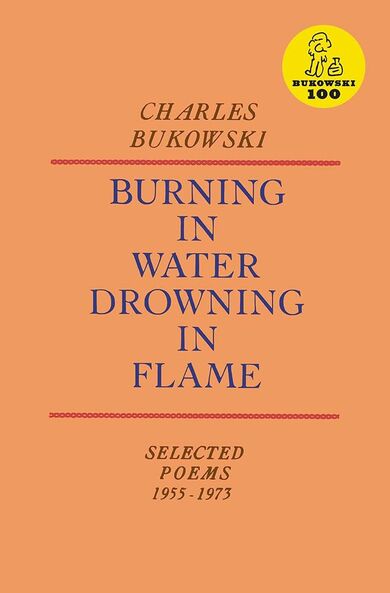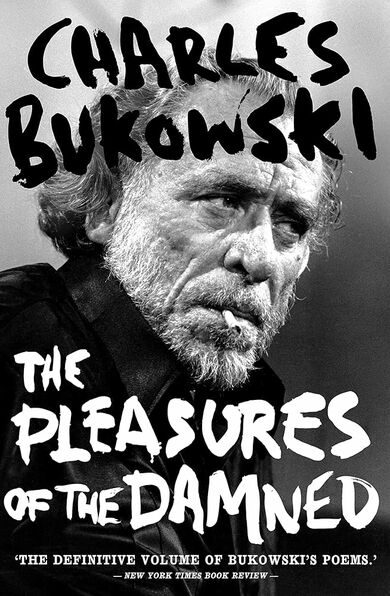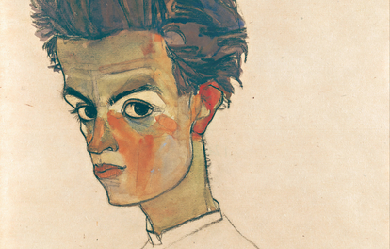Ham on Rye: 5
I had begun to dislike my father. He was always angry about something. Wherever we went he got into arguments with people. But he didn’t appear to frighten most people; they often just stared at him, calmly, and he became
more furious. If we ate out, which was seldom, he always found something wrong with the food and sometimes refused to pay. “There’s flyshit in this whipped cream! What the hell kind of a place is this?”
“I’m sorry, sir, you needn’t pay. Just leave.”
“I’ll leave, all right! But I’ll be back! I’ll burn this god-damned
place down!”
Once we were in a drug store and my mother and I were standing to one
side while my father yelled at a clerk. Another clerk asked my mother,
“Who is that horrible man? Everytime he comes in here there’s an
argument.”
“That’s my husband,” my mother told the clerk. Yet, I remember another
time. He was working as a milkman and made early morning deliveries. One morning he awakened me. “Come on, I want to show you something.” I walked outside with him. I was wearing my pajamas and slippers. It was still dark,
the moon was still up. We walked to the milk wagon which was horsedrawn. The horse stood very still. “Watch,” said my father. He took a sugar cube, put
it in his hand and held it out to the horse. The horse ate it out of his
palm. “Now you try it . . .”
He put a sugar cube in my hand. It was a very large horse. “Get closer!
Hold out your hand!” I was afraid the horse would bite my hand off. The head came down; I saw the nostrils; the lips pulled back, I saw the tongue and
the teeth, and then the sugar cube was gone. “Here. Try it again . . .” I
tried it again. The horse took the sugar cube and waggled his head. “Now,”
said my father, “I’ll take you back inside before the horse shits on you.”
I was not allowed to play with other children. “They are bad children,”
said my father, “their parents are poor.” “Yes,” agreed my mother. My parents wanted to be rich so they imagined themselves rich.
The first children of my age that I knew were in kindergarten. They
seemed very strange, they laughed and talked and seemed happy. I didn’t like them. I always felt as if I was going to be sick, to vomit, and the air
seemed strangely still and white. We painted with watercolors. We planted radish seeds in a garden and some weeks later we ate them with salt. I liked the lady who taught kindergarten, I liked her better than my parents. One problem I had was going to the bathroom. I always needed to go to the bathroom, but I was ashamed to let the others know that I had to go, so I
held it. It was really terrible to hold it. And the air was white, I felt
like vomiting, I felt like shitting and pissing, but I didn’t say anything.
And when some of the others came back from the bathroom I’d think, you’re dirty, you did something in there...
The little girls were nice in their short dresses, with their long hair
and their beautiful eyes, hut I thought, they do things in there too, even
though they pretend they don’t. Kindergarten was mostly white air . . . Grammar school was different, first grade to sixth grade, some of the
kids were twelve years old, and we all came from poor neighborhoods. I began to go to the bathroom, but only to piss. Coming out once I saw a small boy drinking at a water fountain. A larger boy walked up behind him and jammed his face down into the water jet. When the small boy raised his head, some
of his teeth were broken and blood came out of his mouth, there was blood in the fountain. “You tell anyone about this,” the older boy told him, “and
I’ll really get you.” The boy took out a handkerchief and held it to his
mouth. I walked back to class where the teacher was telling us about George Washington and Valley Forge. She wore an elaborate white wig. She often slapped the palms of our hands with a ruler when she thought we were being disobedient. I don’t think she ever went to the bathroom. I hated her.
Each afternoon after school there would be a fight between two of the
older boys. It was always out by the back fence where there was never a teacher about. And the fights were never even; it was always a larger boy against a smaller boy and the larger boy would beat the smaller boy with his fists, backing him into the fence. The smaller boy would attempt to fight hack but it was useless. Soon his face was bloody, the blood running down into his shirt. The smaller boys took their beatings wordlessly, never begging, never asking mercy. Finally, the larger boy would hack off and it would be over and all the other boys would walk home with the winner. I’d walk home quickly, alone, after holding my shit all through school and all through the fight. Usually by the time I got home I would have lost the urge to relieve myself. I used to worry about that.

